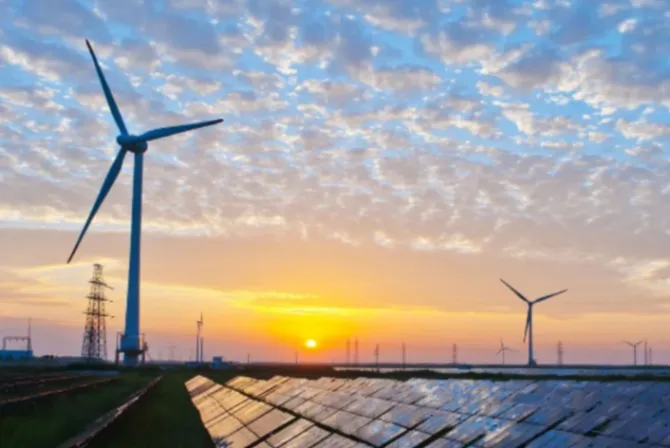-
CENTRES
Progammes & Centres
Location
India has demonstrated its leadership in navigating towards clean and sustainable energy. In this context, India assuming the leadership in carbon finance doesn't seem far-fetched.

In the run-up to the COP28 marking the transition of India’s G20 presidency, the President of COP28, Dr Sultan Al-Jaber made a clarion call with an unmistakable appeal for nations to translate ideas into action lest risking the lives of future generations in peril. As member countries representing diverse geoeconomic blocks clamour for the right wording—phase-out or phase-down—the week-long deliberations in every sense may be heralded as a spectacular success, going by the knowledge repository generated with the participation of one of the most diverse stakeholders ever in shaping the emerging climate action narrative. To that extent, even if the debate is politically charged, the exact wording may be inconsequential. It is indeed laudable that India’s emphasis on climate action as part of its G20 presidency culminated in alliances including the World Biofuel Alliance. The baton to navigate the intricacies of climate action negotiations was rightly handed over to the United Arab Emirates (UAE) as one of the world’s leading energy producers which is ideally dispensed to both mediate and lead the dialogue surrounding the climate action. The UAE has made significant investments in renewable energy including Masdar representing US$ 30 billion. Together with solar and nuclear power, the UAE has a clear roadmap to achieve a 44 percent share of clean energy by 2050. This makes the UAE an ideal candidate to forge consensus in transitioning from fossil fuel under the UAE Consensus—an agreement achieved during COP28.
Even as the world remains fragmented with disparate needs of the Global North vis-á-vis Global South, forums like COP28 provide an ideal platform to hammer out a future for the common good of the planet ahead of appeasement of narrow domestic constituencies. Towards this end, it is inevitable to remain undistracted from compelling narratives harping on provocative metrics like ‘carbon emission per capita’ as economic realities must be inexorably embedded into the large discussions revolving around energy transition in a phased manner without imperilling industrialisation goals of many developing nations. The palpable perils imposed on climate as a fallout of socio-economic unrest in the absence of meeting energy demands is no longer a figment of imagination. Take the mining industry in Africa as an example. For the industry to start switching to clean energy, it is inevitable for mining corporations to employ an optimal energy portfolio to gain cost competitiveness and create sufficient buffers for future capital investment in clean energy. Any attempt towards outright decommissioning of plants would not only imperil economic habitat but risk pushing hapless stakeholders into activities (say deforestation and poaching), posing cataclysmic consequences on the environment and ecology. Unfortunately, the lack of sensitivity towards these grave realities continues to pose a wedge between the Global North and South.
It is here again the unmatched leadership of India and the UAE comes in handy in mitigating these concerns to arrive at a common framework serving the interests of all the stakeholders. The role afforded by the nexus of technology and finance in mitigating climate action cannot be overemphasised. Despite dependency on fossil fuel to grease the wheels of a growing economy, India is already making calibrated attempts towards making the transition towards clean energy with a share in the total energy mix close to 40 percent. As a founding member of the International Solar Alliance (ISA), India has demonstrated its leadership in navigating towards clean and sustainable energy on the back of relentless technological advancements with energy cost per unit reaching a competitive level, albeit slowly. The UAE, on the other hand, as one of the wealthiest nations on per-capita income is ideally dispensed to formulate innovative financial solutions as nations and corporations clamour for specialised finance in marking a strategic shift towards sustainable energy. The announcement of the Global Sustainable Finance Initiative (GSFI) alongside new platforms for energy emissions trading are laudable initiatives in meeting the burgeoning financing gap.
The UAE, on the other hand, as one of the wealthiest nations on per-capita income is ideally dispensed to formulate innovative financial solutions as nations and corporations clamour for specialised finance in marking a strategic shift towards sustainable energy.
In this context, India assuming the leadership in carbon finance doesn’t seem far-fetched. With a captive demand and well-developed capital markets, the timing is perfect for market regulatory bodies like SEBI to initiate necessary reforms towards spearheading an active carbon-trading platform providing efficient and cost-effective avenues for carbon offsets both intra-country and inter-country. This is an opportunity for SEBI to initiate capital market reforms to make India a financial hub for clean energy trading including derivatives (carbon futures) for broadening liquidity and hedging. Gujarat International Finance Tech-City (GIFT) too as an international financial jurisdiction has an opportunity to capitalise on the growing demand of this market.
Perhaps, GIFT as India’s answer to the likes of Dubai International Financial Centre (DIFC) with relatively attractive regulations, is ideally well-placed in launching carbon-credit markets with an incentive for leading international financial institutions to participate in helping in the diversification of risk as well as deepening liquidity. Cross-country international financial market collaborations—say between GIFT and DIFC—could expand the opportunities even further. India as a member of IOSCO should harmonise regulatory and reporting standards to mitigate regulatory arbitrage and attract foreign capital on a level playing field supported on the back of physical infrastructure on clean energy. As India aims to leapfrog as the third-largest economy in the world, the dominance of India’s sovereign currency is inevitable. Towards this end, the facilitation and denomination of new energy financial assets in INR would significantly bolster the internationalisation of the Indian Rupee. The growing volume and value of trade in crude oil benchmarked on Shanghai (CYN) is a case in point.
India as a member of IOSCO should harmonise regulatory and reporting standards to mitigate regulatory arbitrage and attract foreign capital on a level playing field supported on the back of physical infrastructure on clean energy.
India’s version of the sovereign wealth fund, the National Investment & Infrastructure Fund (NIIF) could explore collaborative opportunities with the likes of the Carbon Vision Fund to be set up by the UAE with an explicit mandate to expand the portfolio of allocation in clean technology capable of generating returns commensurate with risks. As India looks to dominate the new energy dialogue as the mascot of the Global South, it is also imperative for policymakers to raise financing through innovative financing including ‘green sovereign’ to channelise investments into the fledgling green-energy industry capable of contributing to the overall economic growth and positioning India as one of the unrivalled leaders in sustainability without plunging fiscal coffers. With an expansive bond market, the private sector can tap international investors seeking exposure in India’s clean energy sector. Green Exchange Traded Fund (ETF), and Green Index Futures with dual listing (eg. NSE Futures in Singapore) could supplement these efforts. Attracting passive funds tracking clean energy alongside sovereign would be seen as a catalyst.
Ullas Rao is a leading academic and financial economist based in Dubai, UAE with stints in prestigious institutions in India and UAE.
The views expressed above belong to the author(s). ORF research and analyses now available on Telegram! Click here to access our curated content — blogs, longforms and interviews.

Ullas Rao is a Faculty member at the London Institute of Banking & Finance (LIBF) and an Associate Professor at the Vijaybhoomi University. ...
Read More +